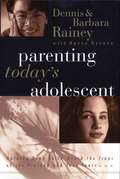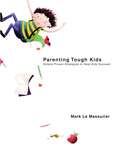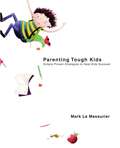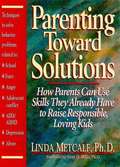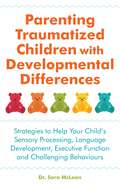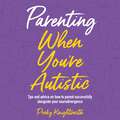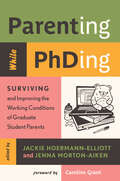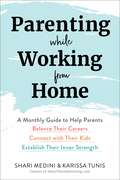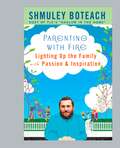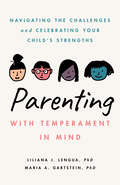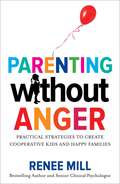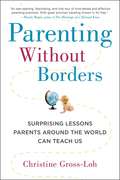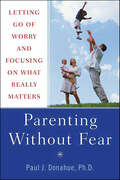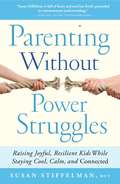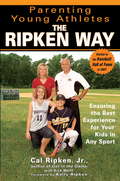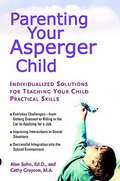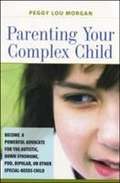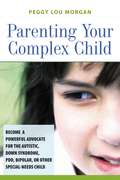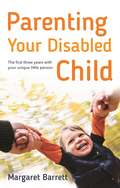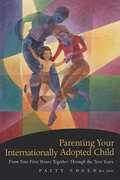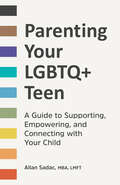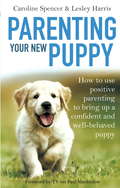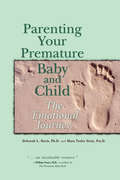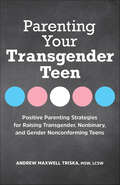- Table View
- List View
Parenting Today's Adolescent
by Dennis RaineyNormally confident moms and dads grow weak-kneed when their children enter--gasp!--puberty. Barbara and Dennis Rainey, parents of six teenage or older children, map out the unfamiliar, demanding landscape of both pre-adolescence (ages 10-12), as well as the teen years that follow."Preadolescence is when convictions are shaped; adolescence is when convictions are tested," they advise parents. In Parenting Today's Adolescent the Raineys help children and parents build a satisfying relationship while forging a vision for a productive, God-honoring life-before, during, and after adolescence.
Parenting Tough Kids
by Mark Le MessurierParenting Tough Kids delivers simple, proven strategies to improve the behavior, organization, learning, and emotional well-being of all children.Parents will find case studies and practical ideas to help youngsters improve memory and organization, complete homework and chores more easily, deal with school bullies, build emotional resilience, and create healthy friendships.
Parenting Tough Kids: Simple Proven Strategies to Help Kids Succeed
by Mark Le MessurierParenting Tough Kids delivers simple, proven strategies to improve the behavior, organization, learning, and emotional well-being of all children.Parents will find case studies and practical ideas to help youngsters improve memory and organization, complete homework and chores more easily, deal with school bullies, build emotional resilience, and create healthy friendships.
Parenting Toward Solutions: How Parents Can Use Skills They Already Have to Raise Responsible, Loving Kids
by Linda MetcalfBased on Solution-Focused Brief Therapy, a counseling model that focuses on times when a specific problem does not occur instead of why it happens, this remarkable new resource helps parents learn how to change their relationships with their children, so children may be empowered to solve their own problems.
Parenting Traumatized Children with Developmental Differences: Strategies to Help Your Child's Sensory Processing, Language Development, Executive Function and Challenging Behaviours
by Sara McLeanChildren who have encountered trauma early in life can experience real differences in their social and cognitive development. This comprehensive guide introduces what such developmental difference means, how it affects a child, and offers strategies to help support or alleviate problems that commonly arise.Dr. McLean explains how children with developmental differences understand the world around them and offers easy to use techniques to help children with sensory and emotional regulation difficulties or delays in language, communication or memory development. This book will provide you with the knowledge and confidence you need to meet your own child's individual needs, and to help them to flourish.
Parenting When You're Autistic: Tips and advice on how to parent successfully alongside your neurodivergence
by Pooky KnightsmithParenting is hard. It's one of those universal constants, like water being wet or grass being green. And being neurodivergent can add an extra layer of tricky to the whole thing. So what can you do?Speaking from a wealth of experience as both a mental health expert and an autistic parent, Pooky Knightsmith guides you through the joys and challenges of raising children in a neurotypical world. From self-care and special interests to meltdowns and managing conflict, the tips and strategies in this book will help you to build a positive relationship with your child, whether they're neurotypical or neurodivergent, all while looking after your own mental health. Always authentic, always practical, sometimes funny, and never judgemental, this book is an essential read for ADHD and neurodivergent parents (and future parents!) looking for advice from someone who's been there and made it work.
Parenting While PhDing: Surviving and Improving the Working Conditions of Graduate Student Parents
by Jackie Hoermann-Elliott Jenna Morton-AikenBeing a PhD student is not easy. Navigating the highly competitive world of academia while working hard for little or no pay would be stressful for anyone—but it’s especially challenging for graduate students who are also parents. Featuring contributions from more than forty current and former graduate students raising children, Parenting While PhDing offers valuable advice for students and administrators. Parents will get practical recommendations on both child care and self-care, learning how to form supportive personal and professional networks while establishing a healthy work/life balance. The collection also offers thoughtful suggestions on how to make graduate programs less toxic and more inclusive. Recognizing that not all graduate students have similar backgrounds or needs, Parenting While PhDing features a diverse range of viewpoints, including queer, trans, disabled, BIPOC, immigrant, and first-generation college students. The authors represent a variety of disciplines, from the natural and social sciences to the humanities and health care professions. Together, they share fresh perspectives on the experiences of graduate students with children and offer strategies they can use to navigate the dual pressures of the academy and parenting.
Parenting While Working from Home: A Monthly Guide to Help Parents Balance Their Careers, Connect with Their Kids, and Establish Their Inner Strength
by Karissa Tunis Shari MediniParenting in December is very different from parenting in July―especially while working from home! As more parents work from home than ever before, there are unique challenges when it comes to meeting the demands of their job, helping their kids thrive, and finding even five minutes to take care of themselves. Parenting While Working from Home offers tips, strategies, and reflections to help parents balance their careers, connect with their kids, and establish their inner strength over the course of a year. Parenting experts and founders of the popular website, Adore Them Parenting, Karissa Tunis and Shari Medini share actionable tips, heartfelt insight, and planning strategies to help you enjoy your own parenting journey while working from home. Building on the authors&’ own experiences and the most common challenges they hear parents voicing today, Parenting While Working from Home encourages parents to make intentional changes that will result in happier families and thriving careers. This practical guide will teach you how to: Manage your time so that both your kids and your job get the attention they needBuild a professional network and maintain your productivity from homeCreate a kid-friendly environment that encourages independence and strong sibling bondsConsistently tune in to your own needs so that you can meet your true potentialAnd so much more While it isn&’t always easy, working from home while raising a family can (and should) be an incredible experience. Parenting While Working from Home offers comfort in shared struggles, new solutions, and calmer days ahead!
Parenting With Fire: Lighting Up the Family with Passion and Inspiration
by Shmuley BoteachA unique parenting manifesto from one of America's most provocative personalities.<P> According to Shmuley Boteach, author of Kosher Sex and host of TLC's Shalom in the Home, transmitting passions, motivating children with shared goals, and getting them excited about values are the most important things any parent can do. With great humor and insight, Boteach shows parents how to take their child to life's mountaintop-and create a parent-child bond based on vitality, exuberance, and mutual respect.
Parenting With Temperament in Mind: Navigating the Challenges and Celebrating Your Child's Strengths (APA LifeTools Series)
by Dr. Liliana J. Lengua Dr. Maria Amy GartsteinThis book will help parents understand and work more effectively with their young child&’s temperament. Effective parenting isn&’t one-size-fits-all. Every child comes with an innate temperament, which includes a unique set of emotional reactions and personal strengths, a motivational style, and needs that demand attention. And every family has its own values and culture. While we cannot change our child&’s natural temperament (nor would we want to!), we can impact their self-regulation systems, nurture their positive behaviors, and promote healthy social and emotional development. In this book, psychologists Liliana Lengua and Maria Gartstein offer readers science-based recommendations for parenting based on the individual temperament of your child and the specific needs of your family. To help readers understand the innate nature of temperaments, the book begins with a brief, accessible overview of the neurobiological systems that underlie temperament. Combining this scientific understanding of temperaments with the latest psychological theories and research, as well as the authors&’ own experience as clinicians and mothers, the authors present four broad parenting principles and then show how to apply these principles with young children of different temperaments. In particular, they focus on a handful of temperament characteristics that, when very strong, can present challenges related to children&’s social, emotional, and behavioral development and well-being. These include being fearful, impulsive, inflexible, and easily frustrated. With its simple practical advice, relatable examples, and questionnaires to help you assess your child&’s temperament and your own parenting practices, this book gives you the tools you need to parent more effectively and strengthen your relationship with your child.
Parenting Without Anger
by Renee MillAs parents, we all want happy children. Ideally, we’d like to bask in the fun and camaraderie of family life, find it easy to love our children unconditionally and have them love us in return. Right? But when everyday activities like waking up on time, getting dressed, eating breakfast or sitting quietly in the car can turn your home into a hotbed of anger, yelling and daily punishments, we’re guessing your dream of a happy, contented home and well-behaved kids is proving difficult. Know you are not alone – many of you report that you are more stressed, more tired and more angry with your children than ever before. In this essential book for modern parents of both children and teenagers, bestselling author and senior clinical psychologist Renee Mill shares practical and easy-to-apply solutions that will help you manage your own anger, so you can successfully implement techniques that will create the contented home, and happy, cooperative family, of your dreams.
Parenting Without Borders: Surprising Lessons Parents Around the World Can Teach Us
by Christine Gross-LohAn eye-opening guide to the world's best parenting strategiesResearch reveals that American kids lag behind in academic achievement, happiness, and wellness.<P><P> Christine Gross-Loh exposes culturally determined norms we have about "good parenting," and asks, Are there parenting strategies other countries are getting right that we are not? This book takes us across the globe and examines how parents successfully foster resilience, creativity, independence, and academic excellence in their children. Illuminating the surprising ways in which culture shapes our parenting practices, Gross-Loh offers objective, research-based insight such as:Co-sleeping may promote independence in kids."Hoverparenting" can damage a child's resilience.Finnish children, who rank among the highest academic achievers, enjoy multiple recesses a day.Our obsession with self-esteem may limit a child's potential.est for children and why. Among her eye-opening findings: Co-sleeping, typical in most of the world's families, may promote independence in kids. American-style "hoverparenting" is unique in the world and can damage a child's resilience. Finnish children, who rank among the world's highest academic achievers, enjoy multiple recesses a day. Our obsession with self-esteem--a concept that doesn't exist in many countries--may limit a child's potential At last bringing empirical research to the debate, Parenting Without Borders offers new and provocative thinking on the secrets to raising a confident and capable generation.
Parenting Without Fear: Letting Go of Worry and Focusing on What Really Matters
by Paul J. Donahue"Dr. Donahue's calm, reasoned approach will help moms and dads sort out their concerns so they can stop worrying about the future and enjoy their rapidly changing kids — now." --Thomas. W. Phelan, author, 1-2-3 Magic: Effective Discipline for ChildrenThe ‘perfect parenting' expectations imposed on you by the media, society, your family, and your community can seem impossible to live up to and only make you more fearful and anxious. Paul Donahue, Ph.D. has uncovered the six most common fears that prevent you from being the effective, loving, and successful parent you want to be:-The Fear of Letting Go-The Fear of Not Doing Enough-The Fear of Taking Charge-The Fear of Slowing Down-The Fear of Unstructured Time-The Fear of Falling BehindParenting Without Fear gives you the tools to confront your fears, rethink your goals and teach your children how to be independent, to persevere, to cooperate and respect adults, to be mindful, to imagine and explore their world, and to develop compassion for others. Discover how to gain the confidence to trust your own judgment, and the courage to make choices about your children's academic, social and athletic lives that reflect your family's values and balance your needs with theirs."Dr. Donahue has masterfully identifies the key fears faced by many parents as they confront the challenges of raising children in today's world and he does so with warmth, humor, and empathy. This book will serve as an invaluable resource for parents." --Robert Brooks, Ph.D., co-author, Raising Resilient Children and The Power of Resilience: Achieving Balance, Confidence and Personal Strength in Your Life"This book provides welcome reassurance to parents who worry they are not doing everything they can for their kids." --Nancy Samalin, M.S., author of Loving without Spoiling and 100 Timeless Tips for Raising Terrific Kids
Parenting Without Power Struggles: Raising Joyful, Resilient Kids While Staying Cool, Calm, and Connected
by Susan StiffelmanDo you ever find yourself asking . . . • How can you get your children to do their homework without meltdowns, threats or bribes? • How can you have a drama-free morning where the kids actually get out the door in time for school? • How can you better manage your kids’ screen time without making them want to hide what they’re doing from you? Family therapist Susan Stiffelman is here to help. While most parenting programs are designed to coerce kids to change, Parenting Without Power Struggles does something innovative, showing you how to come alongside your children to awaken their natural instincts to cooperate, rather than at them with threats or bribes, which inevitably fuels their resistance. By staying calm and being the confident “Captain of the ship” your child needs, you will learn how to parent from a place of strong, durable connection, and you’ll be better able to help your kids navigate the challenging moments of growing up. Drawing upon her successful practice and packed with real-life stories, Parenting Without Power Struggles is an extraordinary guidebook for transforming the day-to-day lives of busy parents—and the children they love.
Parenting Young Athletes the Ripken Way
by Cal Ripken Rick WolffSince he retired from baseball in 2001, Cal Ripken, Jr., has devoted his time to coaching kids, including his own son and daughter, who play baseball and basketball, among other sports. With a baseball league of nearly 700,000 kids, ages 5-12, named for him, he has also had a chance to meet and work with countless young athletes. Cal Ripken's simple yet effective philosophy for helping kids get the most out of playing sports is to keep it simple, explain the "why," celebrate the individual, and make it fun! But Ripken is troubled by what he sees in youth sports: a competitive intensity that removes the element of fun from playing. Now, drawing on his experiences as a father, a player, and a coach to his charges at his youth baseball based organization, Ripken Baseball, the legend offers his insights and advice on how to approach organized sports with your kids to ensure they have the best experience possible, stay fit, and enjoy themselves. Whether you were a star player or a kid who never learned to throw, this book will tell you everything you need to know about sports parenting from the pre-school years to middle school. It covers all the bases, including: Teaching the basics of sportsmanship How an overemphasis on technique or winning can harm your child's game How to develop a good relationship with your child's coach The pros and cons of travel teams and club teams The importance of returning the games to the kids and how best to behave as a parent The latest on performance and nutrition Fun games and exercises to do with your kids to encourage them Why most kids burn out on team sports by middle school and how to avoid it Few athletes embody sportsmanship and fair play as perfectly as Cal Ripken. His advice will inspire confidence in kids and parents alike.
Parenting Your Asperger Child
by Cathy Grayson Alan SohnAsperger's Syndrome is a form of autism--but with the right guidance, these children can go on to live happy, fulfilling lives. In Parenting Your Asperger Child, Dr. Alan Sohn's and Cathy Grayson's groundbreaking Cognitive Social Integration Therapy (CSIT) offers practical solutions that help parents prepare their children for a fulfilling life of social interaction outside the confines of their syndrome, addressing such topics as: - The six characteristics of Asperger's Syndrome - How to identify a child's type of Asperger's--and the best approaches for dealing with it - Understanding how an Asperger's child sees and interprets the world - Replacing inappropriate coping techniques with productive skills - How to survive and learn from a crisis - How school programs can aid in teaching Asperger children - Making changes that last
Parenting Your Complex Child: Become a Powerful Advocate for the Autistic, Down Syndrome, PDD, Bipolar, or Other Special Needs Child
by Peggy Lou MorganMorgan describes ways to parent children with special needs, particularly in communication, adaptation, and communicating with those who can help. She first recounts her experiences with her son, who is multiply disabled, then provides suggestions for working with doctors, tracking day-to-day behavior, schedules and routines, documentation, using service dogs, getting professionals to listen, creating a community, and hiring caregivers. The appendix consists of sample forms and lists. The book is aimed at parents of children with behavior disorders, developmental problems, autism, Down syndrome, bipolar disorder, schizophrenia, ADHD, pervasive development disorder, and others. There is no bibliography. Morgan has worked extensively with special-needs children and their families.
Parenting Your Complex Child: Become a Powerful Advocate for the Autistic, Down Syndrome, PDD, Bipolar, or Other Special-Needs Child
by Peggy MorganBesides the usual parenting challenges, parents of disabled children face added obstacles that can tax the resolve and resources of even the strongest families. Peggy Lou Morgan has developed a powerful system for obtaining dramatically better care for children with one or more serious disabilities. Parenting Your Complex Child reflects the experience and knowledge she has gained through decades of navigating a sea of complex medical, educational, occupational, and social issues while working with disabled clients and with her own son. Morgan's unique tracking and documentation tools let parents adapt to their child's challenges, create routines that support the child's needs, communicate those needs to busy professionals -- and be taken seriously by them. The book also helps parents lay the groundwork for care to continue after they themselves can no longer provide it. Compassionate, practical, and proven, Parenting Your Complex Child helps parents ensure that life-changing decisions are based on the best interests of the child -- and on the best information available.
Parenting Your Disabled Child: The First Three Years
by Margaret BarrettIf you or someone you know has a child with disabilities, this book is for you. Whether the problem is picked up in pregnancy or after birth, or is a result of an accident or of sudden illness Parenting Your Disabled Child takes you through the emotional roller coaster of diagnosis, to coping strategies for babies and toddlers with developmental delay, sensory impairment or learning difficulty. The cause of the disability might be brain damage, a genetic or chromosomal disorder, metabolic disease, traumatic injury, or damage after illness, such as post-meningitis, while conditions may include autism, Down syndrome, attention deficit disorder, hyperactivity, dyslexia, and a host of others. The book has therefore a wide range, but the emphasis remains on the child, rather than the disability. It’s important to bear in mind also that at this stage there may be no diagnosis - many families are not given any diagnosis for at least two years. Meanwhile they have to cope like any other family with a tiny child. Sensitive and practical, the book addresses the common concerns of parenting such as feeding, sleeping, toileting, and the thorny question of discipline. It explains why it is vital to avoid the all-too-common mistake of being over-protective, and how to give small children opportunities for learning and independence. Topics include: Your child’s need for stimulus and interaction Encouraging physical development Intellectual development Social situations How to foster independence Reinforcing good behaviour Life as a family and looking after yourselves
Parenting Your Disabled Child: The First Three Years
by Margaret BarrettIf you or someone you know has a child with disabilities, this book is for you. Whether the problem is picked up in pregnancy or after birth, or is a result of an accident or of sudden illness Parenting Your Disabled Child takes you through the emotional roller coaster of diagnosis, to coping strategies for babies and toddlers with developmental delay, sensory impairment or learning difficulty. The cause of the disability might be brain damage, a genetic or chromosomal disorder, metabolic disease, traumatic injury, or damage after illness, such as post-meningitis, while conditions may include autism, Down syndrome, attention deficit disorder, hyperactivity, dyslexia, and a host of others. The book has therefore a wide range, but the emphasis remains on the child, rather than the disability. It?s important to bear in mind also that at this stage there may be no diagnosis - many families are not given any diagnosis for at least two years. Meanwhile they have to cope like any other family with a tiny child. Sensitive and practical, the book addresses the common concerns of parenting such as feeding, sleeping, toileting, and the thorny question of discipline. It explains why it is vital to avoid the all-too-common mistake of being over-protective, and how to give small children opportunities for learning and independence. Topics include: Your child?s need for stimulus and interaction Encouraging physical development Intellectual development Social situations How to foster independence Reinforcing good behaviour Life as a family and looking after yourselves
Parenting Your Internationally Adopted Child: From Your First Hours Together Through the Teen Years
by Patty CogenA guide for adoptive parents from preparations for a child's arrival through the teen years.
Parenting Your LGBTQ+ Teen: A Guide to Supporting, Empowering, and Connecting with Your Child
by Allan Sadac MBA, LMFTRaise your LGBTQ+ teen with compassion and confidenceParenting teens can be a nerve-wracking experience, and raising an LGBTQ+ teen can present even more questions. This book is filled with guidance, exercises, and inspiration to help you create a nurturing and affirming environment for your teen. You'll discover how to tackle common parenting issues, learn about the LGBTQ+ experience, and gain the confidence and tools to support and empower your teen.Understand your teen—Learn why parenting teens can be so tricky, what important LGBTQ+ terms mean, answers to common questions, and what may be in store for your LGBTQ+ teen.Encourage dialogue—Get tips for sparking important conversations around key topics like mental health, bullying, sex and relationships, gender identity and expression, and more.Explore relatable stories—Discover anecdotes about parents and teens across the LGBTQ+ spectrum so you can gain new perspectives on sexual orientation and gender identity.Understand and connect with your LGBTQ+ teen—and help them truly thrive—with this guide for parents.
Parenting Your New Puppy: How to use positive parenting to bring up a confident and well-behaved puppy
by Caroline Spencer Lesley HarrisIn this practical, readable and entertaining book, Caroline Spencer and Lesley Harris bring a new slant to a well-explored subject and propose significant shifts in an owner's understanding of why their puppy behaves as he does and what makes him tick.Like children, dogs are born without behavioural issues; it is what happens in the early weeks of life, and the way in which his new owner nurtures, guides and educates him that will enable him to become a well-balanced adult - or not.Drawing on a combined 40 years of experience, the authors will help you in your initial choice of a puppy. When you take him into your home, it will show you how to interpret natural canine communication and play, and how to use these signals to educate and guide your puppy in a positive way. The confidence he gains in you, the parent, will help him through sometimes difficult and confusing situations, to become a happy, trustworthy, and trusting friend for life.
Parenting Your Premature Baby and Child
by Ph.D. Deborah L. Davis Mara Tesler Stein"An invaluable resource."--William Sears, MDThe premature birth of a baby is both a medical and family crisis. Within the pages of this comprehensive guide, parents will find compassionate support, practical suggestions for coping and adjusting, and advice that empowers them to handle an array of emotions.
Parenting Your Transgender Teen: Positive Parenting Strategies for Raising Transgender, Nonbinary, and Gender Nonconforming Teens
by Andrew Maxwell TriskaLove and support your transgender teen You're probably reading this because your teenager shared something important about themselves. You want to be supportive, but what does "supportive" mean to transgender, nonbinary, or gender nonconforming teens? This parenting book provides positive parenting tools to support your teen on their journey of self-discovery plus strategies to help you build a stronger relationship with them.What sets this love-centered parenting book apart from other books on parenting teens:Learn—Read about trans identity and learn how gender has been studied throughout history to help you put your child's gender identity into context.Communicate—Show your teen you care by learning the terms used to describe gender identity and how to talk to them about their experiences in accurate and affirming ways.Support—Discover ways you can support your teens' gender expression, like helping them find clothes that fit or taking them to a gender-affirming salon.Advocate—Learn how to talk about your teen's gender to friends and family, how to support your child in school, and the laws that protect trans people from discrimination and harassment.There's a world of information and support out there for you and your teen, and by picking up this book you're taking the first step.
